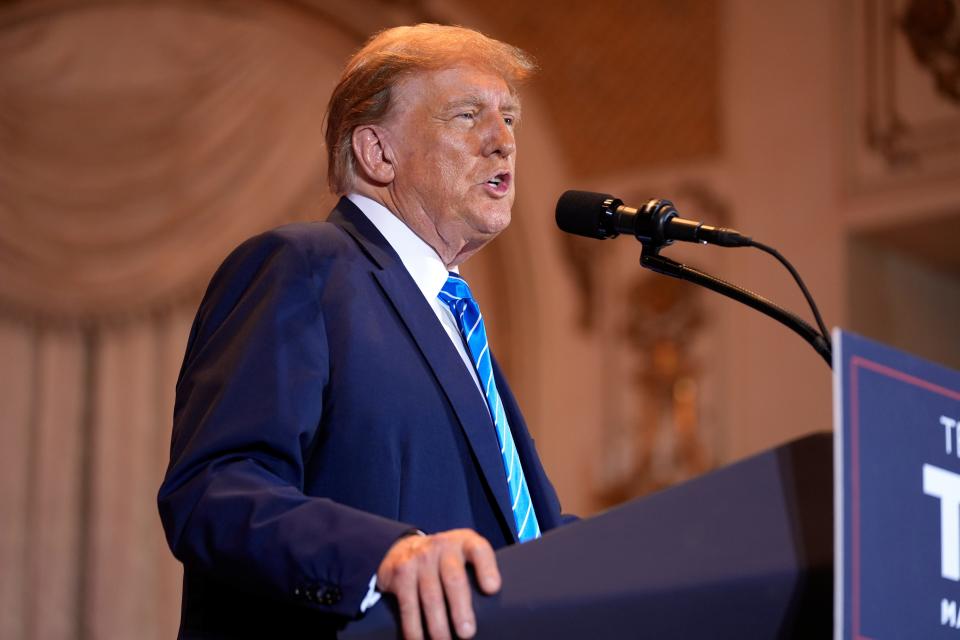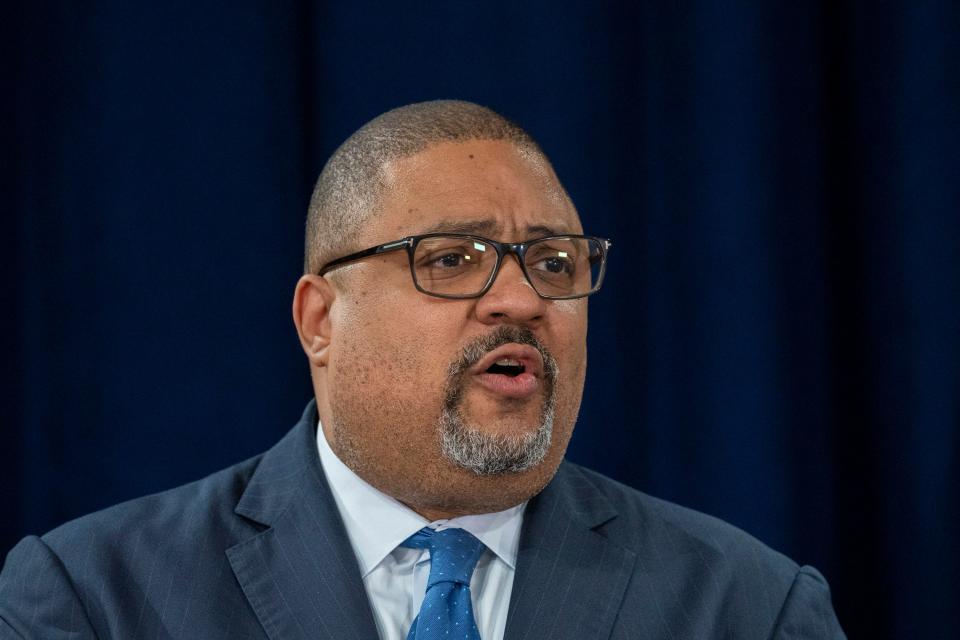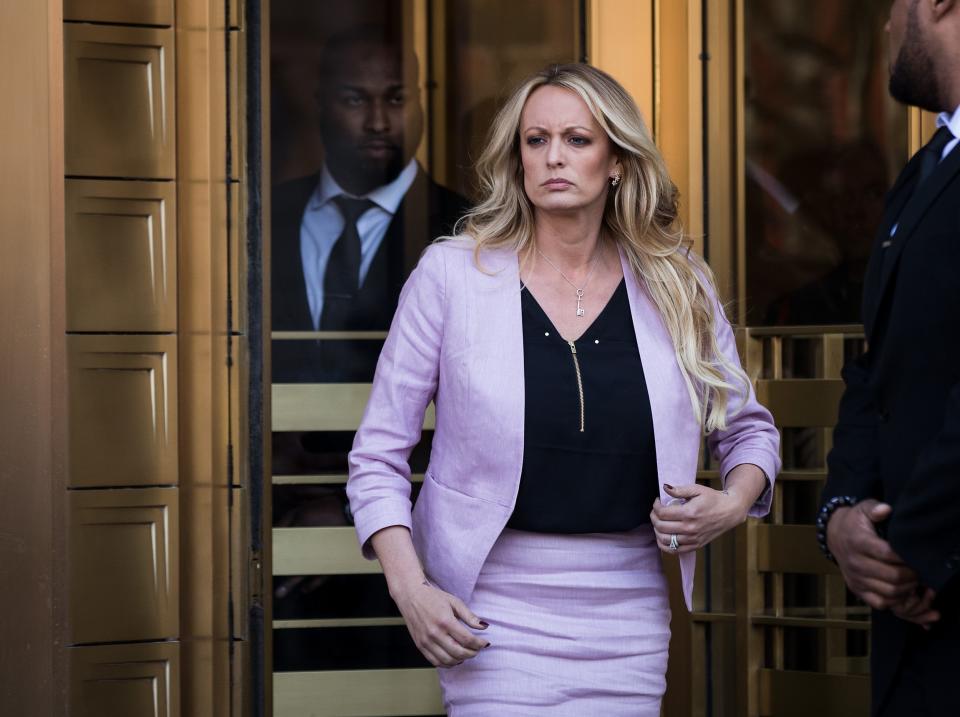Donald Trump claims immunity from NY hush money criminal charges, but legal experts doubtful
- Oops!Something went wrong.Please try again later.
- Oops!Something went wrong.Please try again later.
Former President Donald Trump asked to postpone his pending New York criminal trial on charges he falsified business records to pay hush money to alleged mistresses by pointing to his presidential immunity claim under consideration at the Supreme Court.
Trump argues he is shielded from some of the Manhattan district attorney's allegations because he was president at the time some of his actions took place. But legal experts said it would be difficult for Trump to argue that paying hush money to women was part of his official duties as president, to qualify for immunity.
Trump has already argued he is immune from criminal prosecution in his two federal cases, on charges he tried to steal the 2020 election and for allegedly mishandling classified documents after leaving the White House.
A federal judge and the D.C. Circuit Court of Appeals each ruled Trump is not immune from federal charges. The Supreme Court will hear arguments about the issue April 25.
But the New York trial is scheduled to begin March 25.

Trump: holding NY trial 'unnecessary risk' while immunity is unresolved
Trump contends because the issue is unique – no former president has ever faced criminal charges before – that New York Judge Juan Merchan should postpone his case at least until the Supreme Court rules, to avoid having to hold the trial twice.
“The adjournment would also ‘avoid the unnecessary risk of inconsistent adjudications as to the defenses asserted’ by President Trump in state and federal courts relating to the presidential immunity doctrine,” Trump lawyers Todd Blanche and Susan Necheles wrote in their filing. “Finally, the adjournment would mitigate the risk that an error in the application of this complex federal-law issue could require the Court, the parties, the State, the City, and the County to expend the resources necessary to re-try the case.”
But legal experts said Trump already dropped his argument the New York case involves official acts when he decided not to appeal a rejection of moving his case from state to federal court. U.S. District Judge Alvin Hellerstein ruled that Trump’s alleged conduct in the New York case “does not reflect in any way the color of the President’s official duties.”
"Hush money paid to an adult film star is not related to a President's official acts," Hellerstein wrote.

What charges does Trump face in New York?
Trump has pleaded not guilty to 34 counts of falsifying business records in New York.
Manhattan District Attorney Alvin Bragg argued that Trump falsified the records to hide hush-money payments to Stormy Daniels, a pornographic actress, and Karen McDougal, a former Playboy model, before the 2016 election, to stop them from talking about allegations he had sex with them.
One of Bragg’s key witnesses is Michael Cohen, Trump’s former personal lawyer, who arranged the payments. Cohen has already pleaded guilty and served time in prison on charges including a campaign finance violation for arranging the payments.
Trump criticized Cohen repeatedly as president. Based on pretrial motions, Trump’s lawyers contend that prosecutors seem to be arguing that Trump pressured Cohen not to talk about the payments in 2018, when he was president. Trump contends his Twitter posts and broadcast statements about Cohen were part of his official duties as president and should be immune from prosecution.
On April 21, 2018, President Trump posted about Cohen on Twitter: “Most people will flip if the Government lets them out of trouble, even if . . . it means lying or making up stories. Sorry, I don’t see Michael doing that despite the horrible Witch Hunt and the dishonest media.”
On May 3, 2018, Trump posted on Twitter that he paid Cohen a retainer and the lawyer reimbursed the two women through a private contract that had nothing to do with his presidential campaign.
“Money from the campaign, or campaign contributions, played no rol[e] in this transaction,” Trump posted.
Legal experts have said the payments could be considered an illegal campaign expenditure because the women’s silence was expected to alter the election results.

What other courts are considering Trump's immunity claims?
At the federal level, Trump has argued Supreme Court precedents protect him from criminal charges.
“Without immunity from criminal prosecution based on official acts, the President’s political opponents will seek to influence and control his or her decisions via de facto extortion or blackmail with the threat, explicit or implicit, of indictment by a future, hostile Administration, for acts that do not warrant any such prosecution,” his lawyers wrote.
But federal prosecutors and judges so far have ruled that Trump can be charged.
"For the purpose of this criminal case, former President Trump has become citizen Trump, with all of the defenses of any other criminal defendant," the D.C. Circuit Court of Appeals ruled in his federal election case. "But any executive immunity that may have protected him while he served as President no longer protects him against this prosecution."
This article originally appeared on USA TODAY: Donald Trump claims immunity from NY charges

